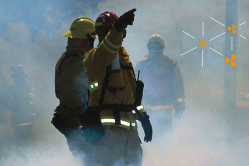The threat
Nuclear and other radiological materials have benefited society in areas of medicine, agriculture, industry and the provision of energy. There is a risk, however, that nuclear or other radiological materials could be used in terrorism or other criminal acts.
The detonation of an improvised nuclear device (IND), radiological dispersal device (RDD), or the placing of a radiological exposure device (RED) would lead to serious consequences. Such incidents would damage human health and the environment, create panic, and affect economic and political stability.
Law enforcement will respond to attacks on radiological and nuclear facilities, lead searches for orphan radioactive sources, or direct complex operations to shut down attempts to purchase radioactive materials through black markets.
Therefore, law enforcement officials must be aware of the threat that can be posed to public safety and have the capability to respond effectively to crimes involving radioactive materials.
Prevent, detect, respond and investigate
Our work against Radiological and Nuclear Terrorism is threat-based and driven by criminal intelligence. Through our Law Enforcement Support Programme, we ensure that our work with our member countries is measurable, sustainable, and based on needs identified through cooperation with beneficiary countries.
Our programme focuses on the following areas:
- Analysis
- Expertise
- Global Partnerships
Gender inclusivity
Aligned with INTERPOL’s Gender Mainstreaming Framework for Capacity Building, we are strongly committed to increasing gender parity across law enforcement contribution to nuclear security. This commitment is maintained, promoted and monitored throughout our programming efforts to ensure gender is considered at all stages of an initiative.
Contact the Radiological and Nuclear terrorism unit.





